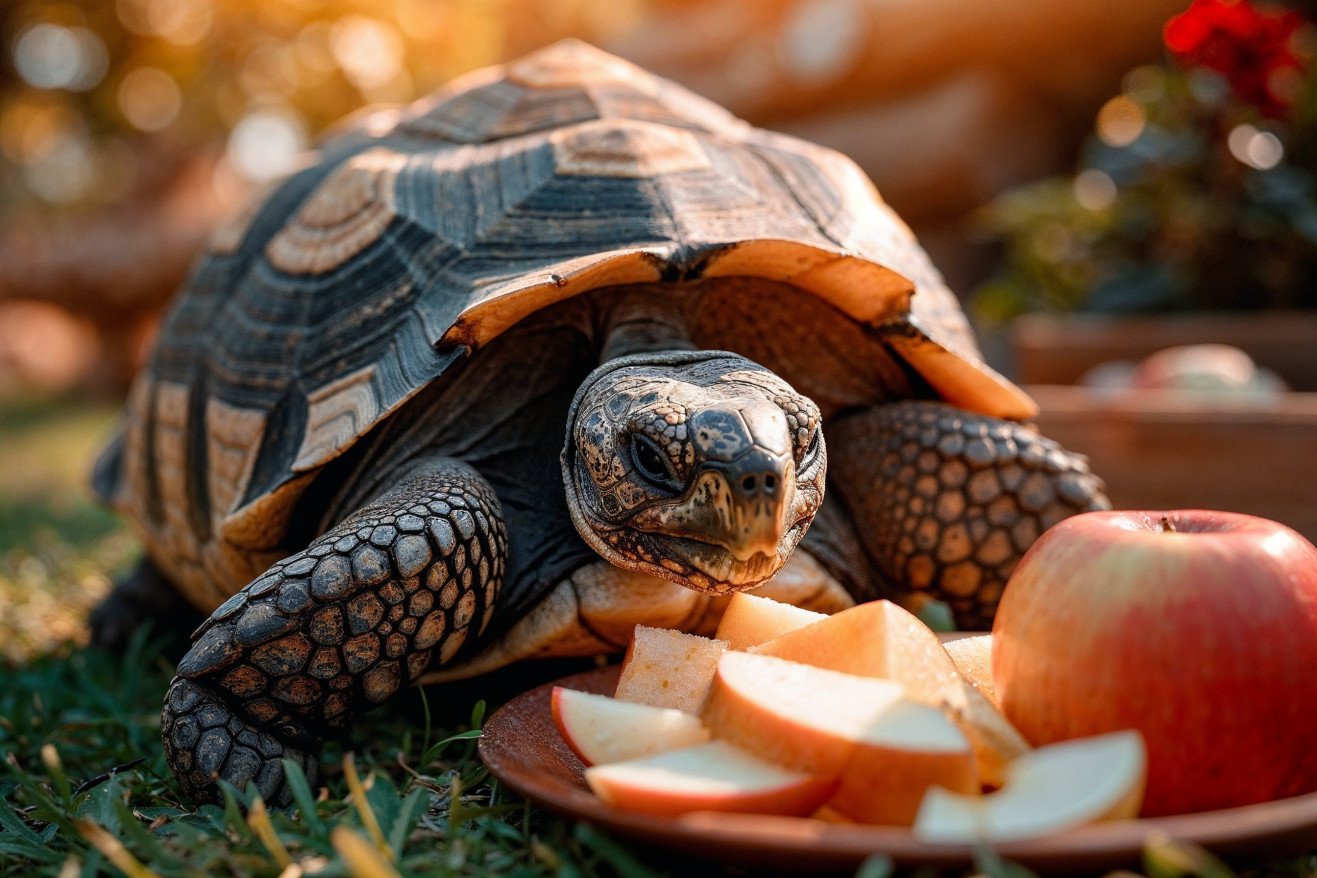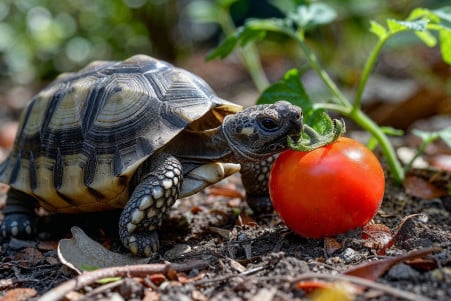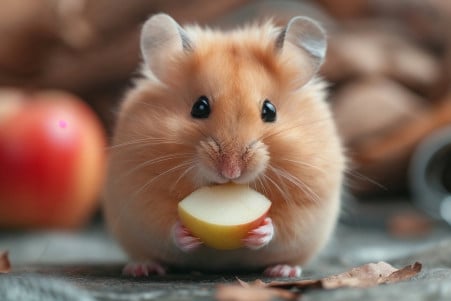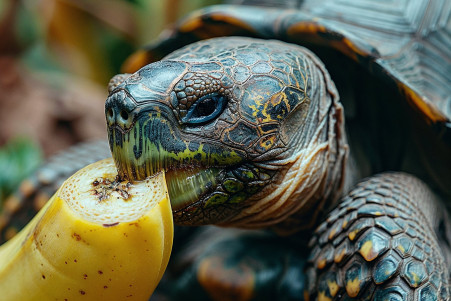Can Tortoises Eat Apples? A Guide to Feeding Your Shelled Friend
26 January 2024 • Updated 28 January 2024

Apples are a dietary staple for many people, but can tortoises enjoy them as a sweet snack as well? While tortoises can eat apples, they should only be given to them as an occasional treat.
It’s also important to note that apple seeds are toxic to tortoises due to their cyanide content. That said, no more than 20% of a tortoise’s diet should consist of fruit to avoid potential health problems like digestive upset and obesity.
This article will take a deep dive into herpetological studies and veterinary nutritional recommendations to help you learn more about what tortoises eat and what they need to eat to stay healthy.
It will also look at how the tortoise digestive system works to break down the sugars and fibers in fruits like apples. This information will help you decide whether or not to include apples in your tortoise’s diet so you can be sure you’re doing what’s best for your pet.
Can tortoises eat apples?
Nutritional Value of Apples for Tortoises
Pet Keen explains that apples can be a healthy and nutritious treat for tortoises, as they are full of antioxidants, dietary fiber, and important vitamins, including vitamin C, which can help support a tortoise’s immune system and overall well-being.
That said, it’s important to make sure that you’re feeding your tortoise apples in moderation to avoid obesity and other health problems. In general, a tortoise’s diet should be made up of 80% vegetables and 20% fruit to make sure they’re getting the nutrients they need.
Apple seeds are toxic because they contain cyanide, so they should be removed before you give the fruit to your tortoise, according to The Tortoise Table. That said, to keep things interesting and make sure your tortoise is getting a well-rounded diet, tortoises can also eat other fruits, including melon, berries, and kiwi, in moderation, according to Hepper.
Feeding your tortoise apples and other fruits in moderation can help make sure they get a tasty, hydrating treat, which can be especially helpful in the summer months, without negatively impacting their health. Just make sure that any fruit you give them is seedless and cut into small, bite-sized pieces.
Different Diets for Different Tortoise Species: Natural Habitats and Health
Tortoises are a highly varied group of animals, and their dietary needs are closely tied to their natural habitats. As a study by Hepper explains, tropical species like the Yellow-footed and Red-footed tortoises live in the rainforest and have a more varied diet that includes fruit, which can make up to 30% of their diet.
On the other hand, Mediterranean species like the Hermann’s, Sulcata, and Spur-thighed tortoises live in areas where fruit is less available, so their digestive systems are less well-adapted to process the sugars in fruit.
For example, the Hermann’s tortoise needs a diet that’s high in leafy greens and flowers, which is similar to the diet it would eat in the wild in a grassland environment.
The Sulcata tortoise, which is native to the desert, needs a diet that’s high in fiber from grasses and succulents, with fruit as an occasional treat at most. Home & Roost stresses the importance of understanding these different diets in order to keep tortoises healthy.
For tortoise owners, it’s essential to make sure that the diet you’re feeding your tortoise matches their species to avoid digestive issues and ensure that they’re getting the nutrients they need. ExoticDirect advises tortoise owners to work with a vet to get species-specific dietary recommendations so that they can make sure they’re giving their tortoise the best care possible.
With the right information and professional input, tortoise owners can make sure that the diet they’re feeding their pet supports their health and well-being.
How the Tortoise Digestive System Works and Responds to Fruits
The tortoise digestive system is a wonder of evolution, adapted to the specific needs of the tortoise diet. According to a paper on PubMed, the digestive tract of the tortoise species Testudo graeca is divided into different sections, each of which has a different function in the digestive process.
For example, the esophagus contains glands that help with initial digestion, while the stomach and intestines contain mucous cells and absorptive cells that help with digestion and absorption.
When tortoises eat fruits like apples, their digestive system breaks down the sugars and fibers in the fruit. According to a source on Radiated Tortoises, tortoises are able to absorb nutrients from their food sources very well, even from sources that other animals might not be able to absorb nutrients from.
This means that tortoises can digest the sugars and fiber in fruits, but they should still be fed in moderation to avoid throwing off the balance of their diet.
It’s important for tortoises to maintain a healthy gut physiology by eating a balanced diet.
A Weebly site on Leopard Tortoises explains that the tortoise’s hindgut system is responsible for re-absorbing water from waste.
This shows that it’s important for tortoises to eat a diet that’s similar to their natural diet, which includes eating fruits in moderation, to maintain their overall digestive health. The way tortoises eat, as well as the way their digestive system works, shows that their diet should be made up mostly of high-fiber plants, with fruits like apples being used as a supplement and not a staple.
Potential Health Concerns: Apples in a Tortoise’s Diet
There are a number of health concerns that come with adding apples to a tortoise’s diet, many of which are related to the fruit’s sugar content. While a small piece of apple can be a sweet treat for a tortoise, a diet high in sugar can lead to obesity and digestive problems.
As Pets on Mom points out, tortoises should have very few treats in their diet, and that includes sweet fruits. The high sugar content in these foods, which is not found in their natural diet, can throw off a tortoise’s digestive system.
The Merck Veterinary Manual explains that dietary imbalances in reptiles can lead to metabolic and endocrine diseases, including gout, which is caused by the buildup of urate crystals due to too much protein or, in the case of tortoises, potentially sugar.
In addition, an article by PetMD explains that metabolic bone disease, which is a concern, can be caused by a lack of calcium or vitamin D in the diet, neither of which are found in sweet, sugary fruits like apples.
To avoid these issues, it’s important to make sure that a tortoise’s diet is as close to their natural diet as possible, which means focusing on grasses and leafy greens that will give them the nutrients they need without the risks that come with high-sugar fruits. By doing this, tortoise owners can make sure that their pets live long, healthy lives without the complications that come with non-native foods.
How to Integrate Apples Into Your Tortoise’s Diet
If you want to give your tortoise apples, it’s important to take the right steps to make sure that you’re keeping them safe and healthy. First, make sure that you’re picking out a fresh apple, and then wash it to remove any pesticides.
After that, core the apple to remove all of the seeds, which contain oxalic acid and cyanide, both of which are toxic to tortoises, says Hepper. Finally, cut the apple into small, bite-sized pieces that your tortoise can easily eat.
In terms of how often you should give your tortoise apples, Hepper recommends giving them to your pet no more than once or twice a week. This is consistent with Pet Keen’s suggestion that fruit should make up no more than 20% of your tortoise’s diet to prevent them from becoming overweight.
In addition to apples, you can also rotate in other tortoise-safe fruits and vegetables like melon, blackberries, carrots, and leafy greens to make sure that your pet is getting a balanced diet.
It’s also important to make sure that you’re always providing fresh water with your tortoise’s meals to help with digestion, as noted by Exotic Direct. Whenever you introduce new foods, make sure that you’re keeping a close eye on your tortoise to see if they’re exhibiting any new behaviors or having any negative reactions.
This way, you can make sure that you’re catching any dietary intolerances early and making sure that you’re keeping your pet healthy and happy.
In Conclusion: Can Tortoises Eat Apples?
As we’ve discussed in this article, tortoises can eat apples, but it’s important to be mindful of how and when you feed them to your pet. While apples do provide some important nutrients like antioxidants and vitamins, they should not be the main part of a tortoise’s diet.
Instead, apples should be used as a supplement and make up no more than 20% of a tortoise’s diet to avoid the health problems associated with too much sugar, according to Pet Keen and The Tortoise Table.
Tortoises come from a wide variety of species, and their dietary needs vary based on the environment they come from. This means that whether you’re taking care of a tropical fruit-eating tortoise or a tortoise from the Mediterranean, you need to make sure that you’re feeding them a diet that’s tailored to their needs, including the amount of fruit they can eat based on their digestive system.
In short, moderation and a diet that’s tailored to the needs of your specific tortoise are the most important things to keep in mind when feeding your pet.
Always talk to a vet to get personalized advice that’s based on the most up-to-date information and your tortoise’s specific health concerns. This way, you can make sure that your tortoise is eating a diet that’s healthy and balanced while still staying true to their natural eating habits.


